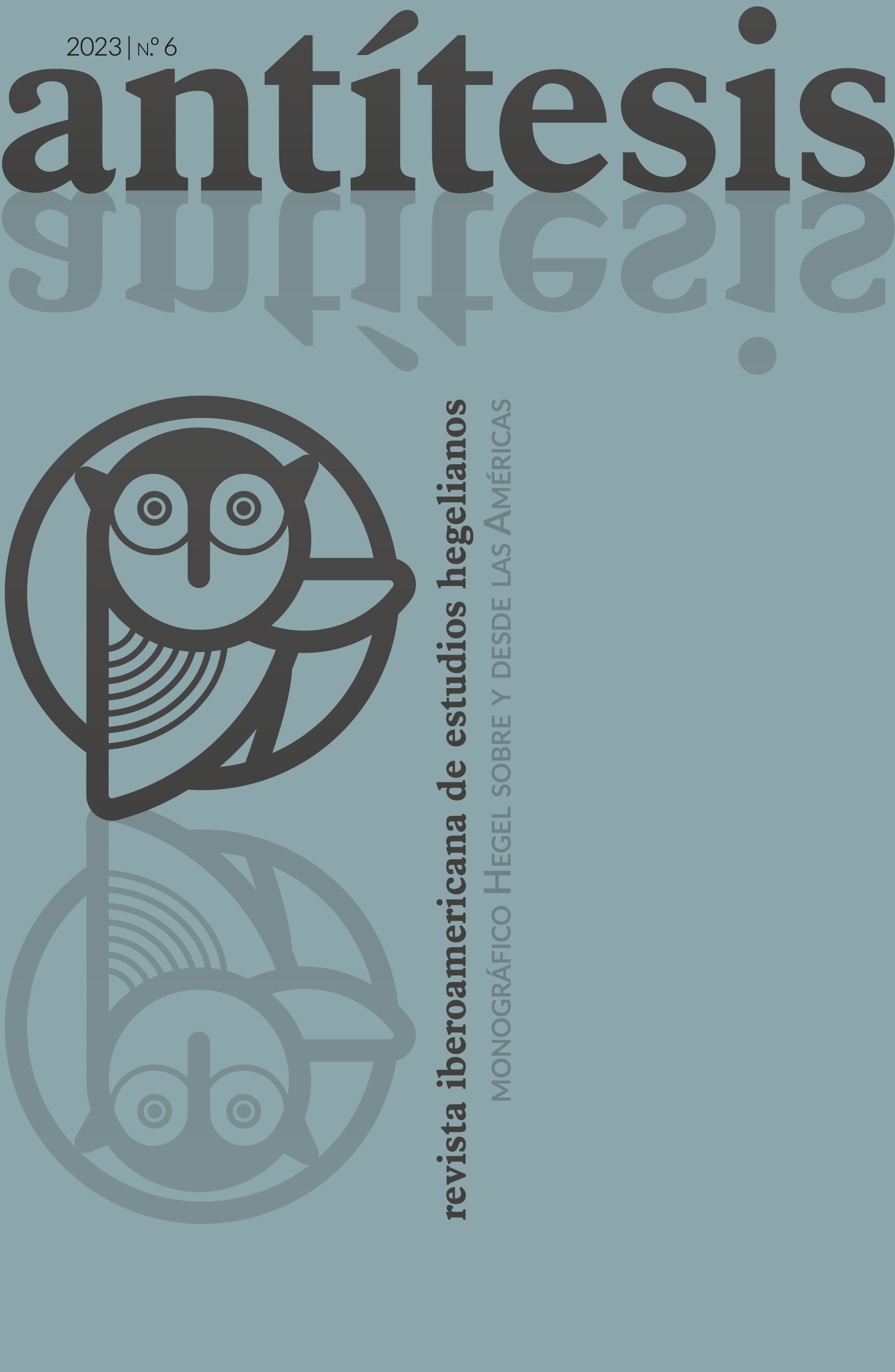HEGEL, Georg W. F. 2022. Creer y saber, o la filosofía de la reflexión de la subjetividad en la totalidad de sus formas, como filosofía de Kant, de Fichte y de Jacobi. Ed. bilingüe de María del Carmen Paredes Martín. Salamanca: Ediciones Sígueme. : Reseña
Keywords:
faith, reason, agnosticism, fideismCopyright (c) 2024 Luis Paris

This work is licensed under a Creative Commons Attribution 4.0 International License.
Abstract
Hegel's article Faith and Knowledge (Glauben und Wissen) from the Jena period was first published in 1802 in the Kritische Journal der Philosophie in Tübingen. In addition to the previous Spanish versions, those by Jorge Aurelio Díaz and those by Vicente Serrano, Spanish-speaking readers now also have the commendable bilingual edition prepared by Dr. María del Carmen Paredes Martín and published by Ediciones Sígueme. The reviewed work contains a succinct presentation by Dra. Paredes Martín, Hegel's text itself and a valuable commentary from the editor. As for Jena's writing, it has as its backdrop the faith-reason opposition openly unleashed by the Enlightenment. There the author reviews the three philosophies of the reflection of subjectivity, namely: the philosophy of Kant, that of Jacobi and that of Fichte. In short, Hegel disapproves of the fideistic agnosticism of these philosophies because they limit knowledge to the finite realm and consider reason powerless on its own to know the absolute, relegating it exclusively to the domain of faith. The German philosopher thus suggests the need for a new rationality capable of overcoming the limitations of understanding. Another relevant aspect of the article is the criticism directed at the metaphysics of finitude. As is known, in the face of the realism of finitude, Hegel would later explicitly propose an idealism of finitude. Finally, the much-discussed "death of God" in Believing and Knowing represents a symbolic constellation related, among other things, to the demise of the metaphysics of finitude and the absence of divinity. For the rest, we recommend reading Believing and Knowing, not only in itself, but as a preface to delve into Hegel's great work.
Downloads
References
REFERENCIAS BIBLIOGRÁFICAS
Fuentes
Hegel, Georg W. F. 1972. Einleitung in die Geschichte der Philosophie. Ed. Johannes Hoffmeister. Berlín: De Gruyter.
- 1984-87. Lecciones sobre filosofía de la religión. 3 vols. Ed. Ricardo Ferrara. Madrid: Alianza.
- 1994. Creer y saber, o la filosofía de la reflexión de la subjetividad en todas sus formas, como filosofía de Kant, Jacobi y Fichte. Trad.
Jorge Aurelio Díaz. Bogotá: Norma.
- 2007. Fe y saber, o la filosofía de la reflexión de la subjetividad en la totalidad de sus formas como filosofía de Kant, Jacobi y Fichte, 2ª
ed. Ed. Vicente Serrano. Madrid: Biblioteca Nueva.
- 2008. Enciclopedia de las ciencias filosóficas. Ed. Ramón Valls Plana. Madrid: Alianza.
- 2010. “Diferencia entre los sistemas de filosofía de Fichte y Schelling”. Trad. María del Carmen Paredes Martín. En Georg W. F. Hegel,
vol. 1, 1-109. Madrid: Gredos
- 2011-13. Lecciones sobre la historia de la filosofía. 3 vols. Trad. Wenceslao Roces. México: Fondo de Cultura Económica.
- 2013a. Ciencia de la lógica. Trad. A. Algranati y Rodolfo Mondolfo. Buenos Aires: Las Cuarenta.
- 2013b. Escritos sobre religión. Ed. Gabriel Amengual. Salamanca: Sígueme.
- 2014. Lecciones sobre las pruebas de la existencia de Dios. Ed. G. Amengual. Salamanca: Sígueme.
- 2015. “Glauben und Wissen”. En Hauptwerke in sechs Bänden, vol. 1 (Jenaer kritische Schriften, eds. Harmut Buchner y Otto Pöggeler,
-414). Hamburg: Meiner Verlag.
- 2017. Creer y saber, o la filosofía de la reflexión de la subjetividad en la plenitud de sus formas como filosofía de Kant, Jacobi y Fichte.
Nueva edición revisada. Trad. Jorge Aurelio Díaz. Bogotá: Siglo del Hombre Editores, Universidad Católica de Colombia.
-2022. Creer y saber, o la filosofía de la reflexión de la subjetividad en la totalidad de sus formas, como filosofía de Kant, de Fichte y de
Jacobi. Ed. bilingüe de María del Carmen Paredes Martín. Salamanca: Ediciones Sígueme.
Bibliografía secundaria
Ginzo Fernández, Arsenio. 2000. Protestantismo y filosofía: la recepción de la Reforma en la filosofía alemana. Universidad de Alcalá,
Servicio de Publicaciones.
Jacobi, Friedrich H. 1996. Cartas al Mendelssohn y otros textos. Trad. José Luis Villacañas. Barcelona: Círculo de lectores.
Paredes Martín, María del C. 2022. Comentario filosófico a Creer y saber, de Georg W. F. Hegel, 275-339. Ed. bilingüe de Paredes Martín.
Salamanca: Sígueme.
Schleiermacher, Friedrich. (1799) 1990. Sobre la religión: discursos a sus menospreciadores cultivados. Trad. Arsenio Ginzo. Madrid:
Tecnos.
Timm, Hermann. 1978. Die Heilige Revolution. Das Religiöse Totalitätskonzept Der Frühromantik: Schleiermacher-Novalis- Friedrich
Schlegel. Frankfurt am Main: Syndikat Verlag.
Vélez León, Marcela. 2021. “Creer” y “saber”: un debate entre Kant, Jacobi y Hegel. Philosophical Readings XIII.1: 23-27. DOI:
5281/zenodo.4071915
